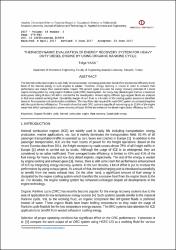| dc.contributor.author | Yasa, Tolga | |
| dc.date.accessioned | 2019-10-18T19:26:02Z | |
| dc.date.available | 2019-10-18T19:26:02Z | |
| dc.date.issued | 2017 | |
| dc.identifier.issn | 1302-3160 | |
| dc.identifier.uri | http://www.trdizin.gov.tr/publication/paper/detail/TWpRek5qZ3lNZz09 | |
| dc.identifier.uri | https://hdl.handle.net/11421/11332 | |
| dc.description.abstract | The internal combustion engine is used daily for transportation and energy production beside their low thermal efficiency level. Most of the thermal energy in such engines is wasted. Therefore, energy recovery is crucial in order to enhance their performance and reduce their environmental impact. The present paper discusses the energy recovery potential of a diesel engine cooling system by using organic Rankine cycle (ORC) based system. An heavy-duty diesel engine that has a maximum brake power rating of about 345 kW is selected for the investigation. Around eighty different type organic fluids are analyzed to find most suitable working fluid. Operability margin of each fluid as a function of the cooling system pressure is identified based on fix evaporator and condensation conditions. The mass flow rates required for each ORC system are computed together with the cycle thermal efficiencies. The results show that such ORC system is capable of recovering up to 13.6% of the engine waste heat which corresponds to a power recovery of about 24 kW and enhances the diesel engine brake efficiency by 2.4%. | en_US |
| dc.description.abstract | The internal combustion engine is used daily for transportation and energy production beside their low thermal efficiency level. Most of the thermal energy in such engines is wasted. Therefore, energy recovery is crucial in order to enhance their performance and reduce their environmental impact. The present paper discusses the energy recovery potential of a diesel engine cooling system by using organic Rankine cycle (ORC) based system. An heavy-duty diesel engine that has a maximum brake power rating of about 345 kW is selected for the investigation. Around eighty different type organic fluids are analyzed to find most suitable working fluid. Operability margin of each fluid as a function of the cooling system pressure is identified based on fix evaporator and condensation conditions. The mass flow rates required for each ORC system are computed together with the cycle thermal efficiencies. The results show that such ORC system is capable of recovering up to 13.6% of the engine waste heat which corresponds to a power recovery of about 24 kW and enhances the diesel engine brake efficiency by 2.4%. | en_US |
| dc.language.iso | eng | en_US |
| dc.rights | info:eu-repo/semantics/openAccess | en_US |
| dc.subject | Ortak Disiplinler | en_US |
| dc.title | Thermodynamic Evaluation of Energy Recovery System For Heavy Duty Diesel Engine By Using Organic Rankine Cycle | en_US |
| dc.type | article | en_US |
| dc.relation.journal | Anadolu Üniversitesi Bilim ve Teknoloji Dergisi :A-Uygulamalı Bilimler ve Mühendislik | en_US |
| dc.contributor.department | Anadolu Üniversitesi | en_US |
| dc.identifier.volume | 18 | en_US |
| dc.identifier.issue | 3 | en_US |
| dc.identifier.startpage | 573 | en_US |
| dc.identifier.endpage | 583 | en_US |
| dc.relation.publicationcategory | Makale - Ulusal Hakemli Dergi - Kurum Öğretim Elemanı | en_US |


















